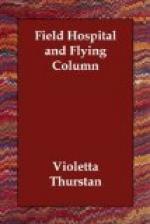On Wednesday, September 30, the sounds of cannon grew more distant, and we heard that Wavre St. Catherine had been taken. The Belgians were still confident, but it seems certain that the Germans were convinced that nothing could withstand their big guns, for they made every preparation to settle down in Brussels for the winter. They announced that from October 1 Brussels would be considered as part of German territory, and that they intended to re-establish the local postal service from that date. They reckoned without their host there, for the Brussels postmen refused to a man to take service under them, so the arrangement collapsed. They did re-establish postal communication between Brussels and Germany, and issued a special set of four stamps. They were the ordinary German stamps of 3, 5, 10 and 20 pfennig, and were surcharged in black “Belgien 3, 5, 10 and 20 centimes.”
About this time, too, they took M. Max, the Burgomaster, off to Liege as prisoner, on the pretext that Brussels had not yet paid the enormous indemnity demanded of it. He held the people in the hollow of his hand, and the Brussels authorities very much feared a rising when he was taken off. But the Echevins, or College of Sheriffs, rose to the occasion, divided his work between them, and formed a local police composed of some of the most notable citizens of the town. They were on duty all day and night and divided the work into four-hour shifts, and did splendid work in warning the people against disorderly acts and preventing disturbances. It is not difficult to guess what would have happened if these patriotic citizens had not acted in this way—there would most certainly have been a rising among the people, and the German reprisals would have been terrible. As it was a German soldier who was swaggering alone down the Rue Basse was torn in pieces by the angry crowd, but for some reason this outbreak was hushed up by the German authorities.
V
A MEMORABLE JOURNEY
The authorities seemed to be far too busy to trouble themselves about our affairs, and we could get no news as to what was going to happen to us. There was a good deal of typhoid fever in Brussels, and I thought I would employ this waiting time in getting inoculated against it, as I had not had time to do so before leaving England.
This operation was performed every Saturday by a doctor at the Hopital St. Pierre, so on Saturday, October 3, I repaired there to take my turn with the others. The prick was nothing, and it never occurred to me that I should take badly, having had, I believe, typhoid when a child. But I soon began to feel waves of hot and cold, then a violent headache came on, and I was forced to go to bed with a very painful arm and a high temperature. I tossed about all night, and the next morning I was worse rather than better. At midday I received a message that every English




